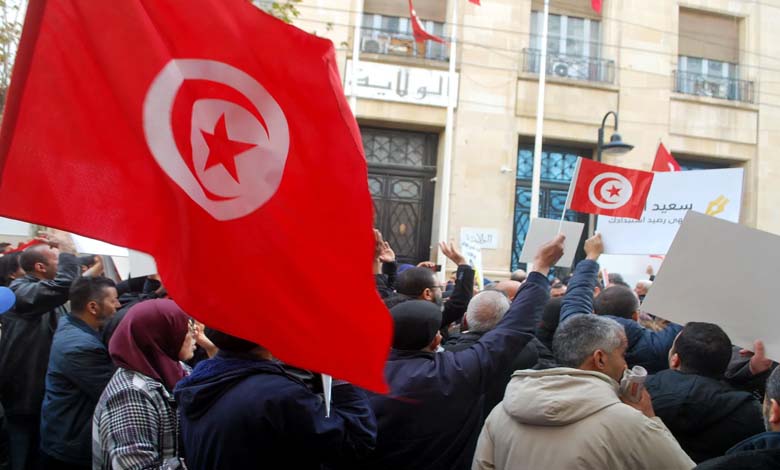Four Years After the Fall of Tunisia’s Muslim Brotherhood: An End Mandated by the People

There came a moment when the darkness had to lift, and the long years of violations and abuses had to end. That moment came on July 25, 2021 — a date that marked the fall of the Muslim Brotherhood in Tunisia, as demanded by the people and enacted by President Kais Saied through exceptional measures that ended a dark decade and opened the path to reform and nation-building.
-
Tunisia’s Muslim Brotherhood and the Poison of Discord in Gabès Protests They Once Ignored
-
Tunisia’s Muslim Brotherhood Entrenched in Rumors: A Blade Without an Edge
On that day, Tunisia moved to dismantle Islamist rule by announcing a series of extraordinary decisions, including the suspension of parliament — then led by Ennahdha’s leader Rached Ghannouchi — the dismissal of Prime Minister Hichem Mechichi, an ally of the movement, and the lifting of immunity for members of parliament. The legislature was officially dissolved on March 30, 2022.
These exceptional measures also led to the dissolution of the Supreme Judicial Council and several other constitutional bodies, such as the National Anti-Corruption Authority.
-
Tunisia’s Muslim Brotherhood and the Recruited Fighters Case: Verdicts Close a Dark Chapter
-
Tunisia’s Muslim Brotherhood Pursues Internal Destabilization: What’s New?
President Saied issued Decree No. 117, which served as a provisional constitution, suspending the 2014 charter adopted under the influence of the Muslim Brotherhood. Dozens of judges affiliated with the movement were removed from office, curbing the Brotherhood’s influence within the judicial system.
On July 25, 2022, a national referendum ratified a new draft constitution with overwhelming public support, shifting Tunisia’s political system from a parliamentary to a presidential model. Later that year, Saied called for legislative elections in which Brotherhood-affiliated parties were barred from participation, leading to the formation of a new parliament.
-
Conspiracy Deepens the Wounds of Tunisia’s Muslim Brotherhood: Leaders in Prison and Disillusioned Base
-
Tunisia’s Brotherhood remnants under scrutiny… Saied: They have no place
In February 2023, over 80 political figures — most of them from Ennahdha — were arrested for plotting to overthrow the government. They were charged under Tunisia’s anti-terrorism laws with conspiring against state security. In April 2023, Rached Ghannouchi was arrested on similar charges, later facing additional convictions. All of Ennahdha’s offices were shut down, and arrests of the group’s leadership accelerated as investigations uncovered deeper involvement in political and economic crimes.
Observers consider July 25, 2021, a critical moment that saved Tunisia from the destructive grip of the Brotherhood, which had violated human rights, destabilized the country, drained its economy, and fueled violence and political assassinations.
-
44 Years of Chaos: Tunisia’s Muslim Brotherhood – From a Bloody Past to an Inevitable Downfall
-
Tunisia’s Muslim Brotherhood and the Takeover of Tribune: A New Compass for a Struggling Movement
Tunisian political analyst Abdelrazek Reïs asserts that this date is etched in the national consciousness as the end of a grim era dominated by Ennahdha. He states that the movement has lost all legitimacy, with its first- and second-tier leaders either imprisoned or politically irrelevant. The party is now ostracized both politically and socially, having lost all its public support.
He points out that from 2011 to 2021, Tunisia experienced years of terrorism, bloodshed, assassinations, lawlessness, and widespread corruption. He also highlights the symbolic significance of July 25 in Tunisian history: it marks not only the abolition of the monarchy and the birth of the republic in 1957, but also the assassination of Popular Current Party Secretary-General Mohamed Brahmi on July 25, 2013, allegedly by operatives from the banned group Ansar al-Sharia, acting on orders linked to the Brotherhood.
-
Tunisia Thwarts the Muslim Brotherhood’s Plans in International Justice
-
A TV Report in Tunisia Keeps the Muslim Brotherhood in a “State of Emergency”
Brahmi was shot 14 times in front of his wife and five children outside their home in the capital’s suburbs. Six bullets struck his upper body, while eight hit his left leg. The gunmen, Boubaker Hakim and Lotfi Zine, used a 9mm pistol while riding a motorcycle. Investigations revealed both were members of the terrorist group Ansar al-Sharia, and official accusations implicated Ennahdha in the political assassination.
-
Tunisia in 2025… Year of « Security Vigilance » and Resolution against the Muslim Brotherhood
-
“The Secret Apparatus” of Tunisia’s Brotherhood: A “Black Box” from Darkness to Light
-
Tunisia’s Brotherhood Announces the ‘Buzz’: ‘Blue Flies’ Swarm over the ‘Rumor Dumps’
-
How Kais Saied Ended the Control of the “Muslim Brotherhood” Over Tunisia and Its Institutions: A Report Explains
-
Tunisia’s Brotherhood Still Trying to Escalate the Situation… What Have They Done?
-
Tunisia Ends the Era of the Muslim Brotherhood: Kais Saied Wins Presidential Election in the First Round
-
Tunisian Muslim Brotherhood Leader Sentenced to Three Years in Prison
-
Hours After His Release… Tunisian Authorities Re-Arrest Muslim Brotherhood Leader












